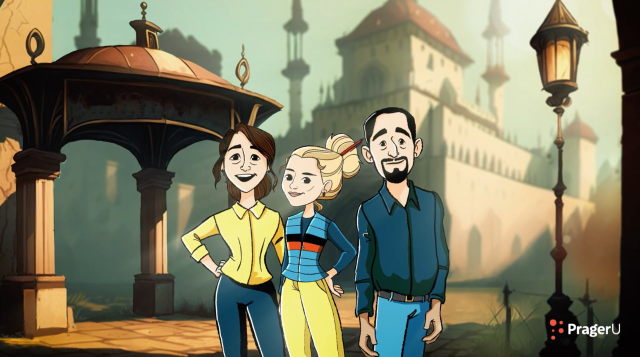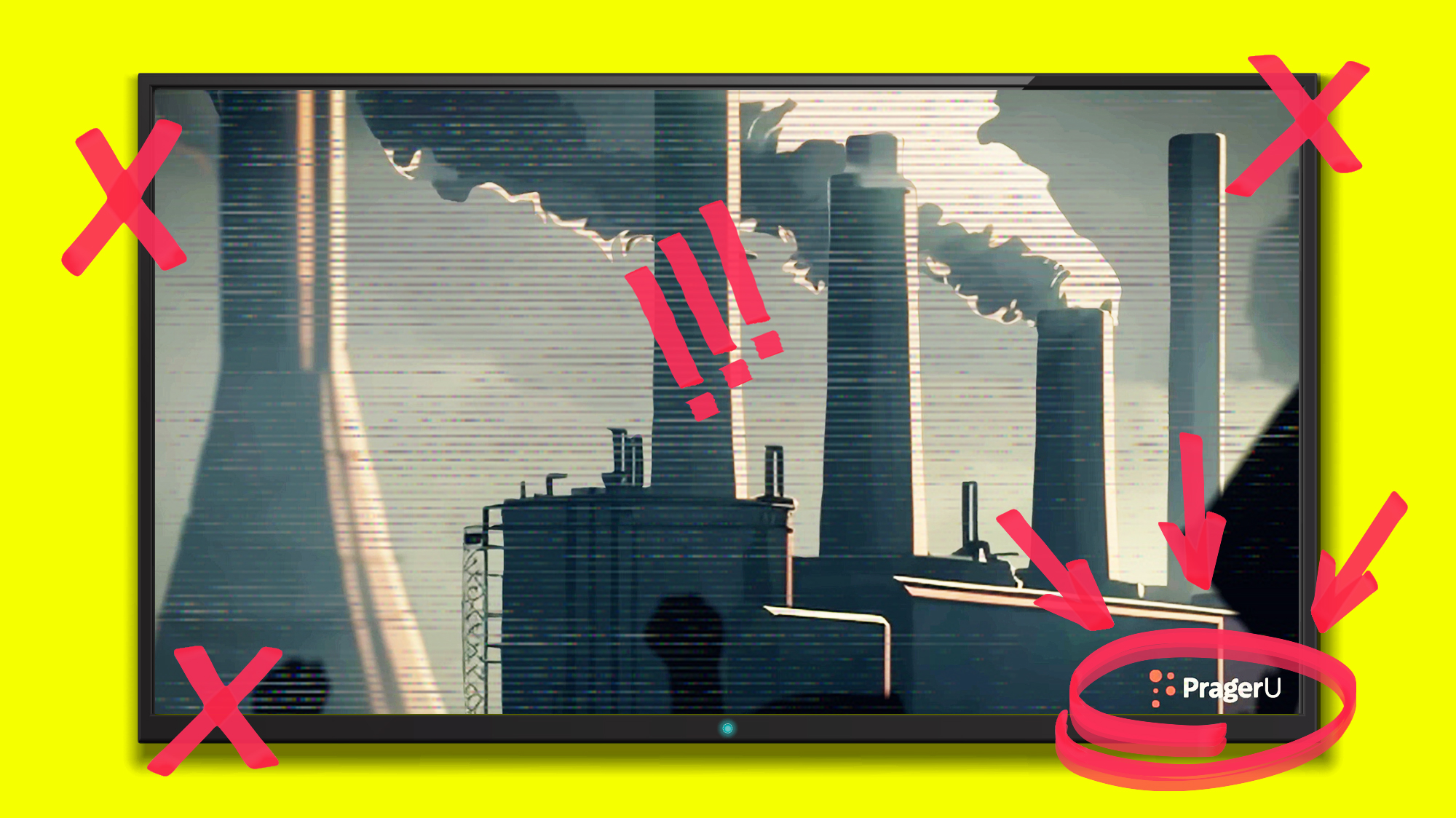If the culture war has a ground zero, it may be Florida schools. Under Gov. Ron DeSantis’ administration, the state has banned discussions about sexual orientation or gender identity in classrooms up to third grade; prohibited “critical race theory” (a concept that educators say was never taught in grades K–12); made it easier for parents to ban books with racial or LGBTQ themes; and, most recently, approved public school guidelines that imply slavery benefited some Black people.
In DeSantis’ own words, “Florida is the place where woke goes to die.”
It’s also, apparently, where science goes to die. Last month, Florida became the first state in the nation to approve the use of “educational” videos produced by the conservative organization Prager University Foundation, a group co-founded by right-wing radio host Dennis Prager. While no school district has announced plans to show any of PragerU’s videos, NPR reports, there’s nothing to stop teachers from independently airing the material. As a Florida Department of Education spokesperson said in a statement, the material aligns with Florida’s revised civics and government standards.
One of those videos, a nine-minute animation titled Poland: Ania’s Energy Crisis, includes what experts say are several climate-denial talking points. In it, the central character, Ania, questions the climate science she’s taught in school and grows concerned about rising energy costs due to a ban on coal in her home country of Poland. She wonders whether renewables can provide the country with enough energy, and loses friends over her beliefs. But she’s comforted by her family’s “stories of perseverance,” like, in her grandfather’s case, fighting Nazis during the Warsaw Uprising. “Ania is realizing that fighting oppression is risky and that it always takes courage,” the video’s narrator says—seeming to make an indirect comparison between Nazis and climate activists. (When I reached out to PragerU for comment, a spokesperson for the group did not address the comparison.)
If the message sounds like it was spun up by oil and gas interests, that’s no coincidence: As E&E News first reported, Prager University, which is not an actual university, has received funding from Texas fracking billionaires Farris and Dan Wilks and the Lynde and Harry Bradley Foundation, which has worked to undo climate regulations. Last month, as E&E News noted, Prager told the conservative group Moms for Liberty, “We bring doctrines to children…But what is the bad of our indoctrination?”
But according to Kristina Dahl, the principal climate scientist at the Union of Concerned Scientists, PragerU’s video does a “disservice” to kids because it’s not honest about the facts. “I find something like this, that seems to be deliberately misleading kids about how we’re going to solve climate change, to be really dangerous,” she tells me.
To better contextualize PragerU’s climate video, I asked Dahl, who is also a mother of two kids in public schools, to review and respond to Ania’s Energy Crisis. Overall, she says, “the visuals and the text together are really trying to lead people down one emotional path, leaving the science aside.” For one, there’s the selection of Ania—a white, middle-class student—as the central character, someone who would be “relatively insulated from the effects of climate change,” Dahl notes. And then there’s the key moment where Ania’s parents tell her not to worry about Poland’s emissions because the Earth has been warming and cooling since prehistoric times, and that countries like China and India are burning way more fossil fuels—points that are often raised by climate deniers, Dahl says.
“By the time I got to the end of the transcript,” she adds, “I was sort of out of politeness.”
Below is a transcript of the video with Dahl’s comments, which she shared with me in writing and during an interview. You can view them by clicking on the highlighted text below.
Poland: Ania’s Energy Crisis (annotated)
“Welcome to Poland. Located in central Europe, Poland shares its borders with seven other countries. So the culture reflects many influences and thousands of years of history.
“But living next to stronger countries has often meant trouble. After Nazi Germany invaded during World War II, most of Poland’s Jews perished in concentration camps. When the Russians drove the Nazis out, they occupied Poland themselves, forcing people to live under communism. Eventually, Poland elected its own democratic government, and the Soviet system collapsed. Poland grew prosperous and joined the European Union in 2004.
“Like many growing countries, Poland relies on fossil fuels. During the freezing winter, many people burn coal to heat their homes. As part of a global effort to curb carbon emissions, Poland’s leaders promised to cut all coal production by 2049 and switch to renewable energy. But will it work? Those living in fear of climate change are eager to do anything it takes. But others are starting to ask questions.

Ania, with her mother and father
“This is Ania. She lives with her parents, Tymon and Klara, in the old city of Krakow. Every morning Ania walks to school with her best friend, Magda. Sometimes after classes, they stop in Old Town and visit Ania’s aunt Zofia, who owns a popular cafe that has been in the family since World War II. When Ania is not helping out at the cafe or writing in her online blog, she loves visiting her Grandfather Jakub with her family. Sometimes Aunt Zofia joins them or even Ania’s brother Michal, who drives his own freight truck. Then it’s really a party.
“Recently, Ania’s classmates have all been talking about climate change. Like many people around the world, they think that Poland’s smog and carbon emissions will contribute to rising temperatures across the planet. Ania knows that coal pollution is a problem. Coal-powered plants create 70 percent of Poland’s electricity, and around 37 percent of the population burns coal to heat their homes in the winter. In response to the smog this creates, cities like Krakow have banned the cheap brown coal people use. But Ania’s teacher says that is not enough. And if Poland doesn’t eliminate all fossil fuels, ecosystems throughout the world will collapse.
“With her teacher’s direction, Ania is writing about the dangers of climate change on her blog. She even gave a speech at a climate conference. Ania’s parents are proud of her hard work. But when her anxiety gets high and she tells them that fossil fuels will soon lead to a climate disaster, they challenge her with some thought-provoking questions: They encourage her to consider how the planet has been warming and cooling since prehistoric times, long before carbon emissions were a factor. Can she explain that? They ask her, “If everyone in Poland stops using coal, will that lower Earth’s temperature? Especially when countries like China and India burn many times the amount of coal as Poland, and are not cutting back?” Her parents’ questions have made Ania wonder if she’s only been hearing one side of the argument at school and in her online community. She definitely has some research to do.
“In 2022, Russia invaded Ukraine, and Poland supported the Ukrainian people. As a result, Russia stopped supplying Poland with natural gas, and Poland banned the Russian coal that many people use to heat their homes. These sudden changes are making energy even more expensive. Ania is finally recognizing the bitter irony: Poland’s efforts to be more green had left them vulnerable to Russia’s manipulations. And unlike her friends, she’s starting to wonder, are her country’s wind farms and solar panels producing enough energy to replace the coal and gas everyone had been using?
“From what she’s reading, Ania sees that renewable energy sources don’t contribute that much energy. Unlike coal or fossil fuels, energy from wind or sun is unreliable, expensive, and difficult to store. In fact, only 10 percent of the world’s energy comes from those sources.
“This makes Ania wonder, where will Poland get the energy it needs? If coal and gas are banned, and if renewable energy isn’t enough, then what’s the plan? When Ania brought this up in class, her friends just stared at her. Her teacher didn’t have a good response. And even Magda did not back her up. This gave Ania the uncomfortable feeling that her questions were not welcome.
“It’s fall now, and around the country, many are struggling with energy poverty. With the ban on Russian coal and gas, people can’t afford or even find fuel to heat their homes. Heating and electricity bills are much higher than they were a few months ago. Around the neighborhood Ania sees people storing wood, old furniture, and smelly trash in their yards. Soon, when the temperature drops, her neighbors will burn that trash to stay warm and cause more toxic pollution than they would by burning coal.
“Energy poverty means trouble for the family. Aunt Zofia worries about the cost of running her cafe in the freezing winter months. Her gas bill is nearly 10 times higher than it was a few months ago. And everyone is worried about Grandfather Jakub. If he’s not able to keep his apartment warm, his coughing and lung problems will get worse.
“Ania is blogging all about fossil fuels, and how energy poverty, not climate change is the real threat. She’s presenting evidence from her research in every blog post, but the response is not what she expected. Many readers are posting mean comments. At school, most of her friends barely talk to her anymore. Even Magda, who can smell the fumes from the burning trash, continues to believe that Poland’s coal ban is saving the Earth. After many arguments, they’ve stopped walking together.
“Losing friends has been hard for Ania, but her family is proud of her for telling the truth. Tymon, Klara, and Grandfather Jakub are encouraging Ania by sharing their own stories of perseverance. Tymon remembers having to meet people late at night in a freezing cellar to avoid the communist authorities. But that didn’t stop him from sharing his ideas. Grandfather Jakub tells her about the Warsaw Uprising, when the city’s Jews fought back against the Nazis. Jakub remembers helping smuggle food, blankets, and even ammunition to the Jewish resistance fighters in sewer tunnels. Through her family’s stories, Ania is realizing that fighting oppression is risky and that it always takes courage.
“It’s winter now, and Ania’s blog is reaching many new readers. But her last post was a sad one. After 60 years of family ownership, Aunt Zofia had to close the cafe. When Magda heard the sad news, she finally apologized to Ania and the two girls joined Ania’s family for one last celebration at the cafe. After publishing her blog post, Ania’s new readers thanked her and shared stories of soaring energy prices and struggling businesses all over Europe.
“To everyone’s surprise, Poland’s government removed the restrictions on brown coal, allowing people to use it to heat their homes. Ania is now using her blog to fund raise money and buy cheap brown coal from Poland’s neighbor, the Czech Republic. She’s even gone with Michal to pick it up in his truck and deliver it to people all across the region. Finally, things are happening in Ania’s house. Michal is spending time at home to help plan the coal deliveries. Aunt Zofia comes over for dinner and to visit with Grandfather Jakub, who moved into their spare bedroom. Jakub is delighted to be living with the family once again. He reminds them that no matter what happens, they’re better together.”

















